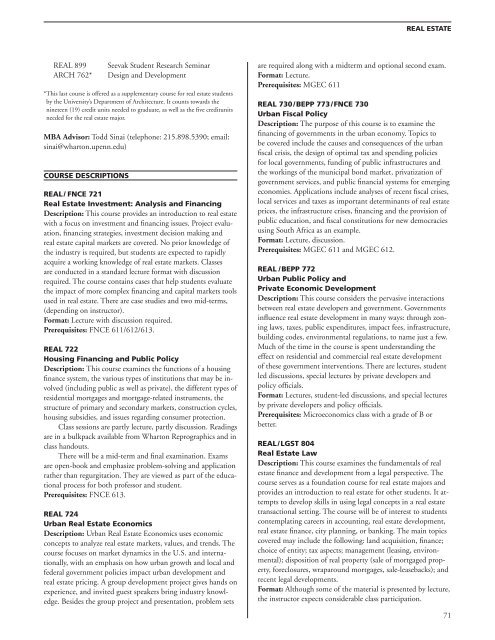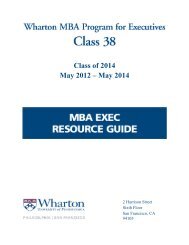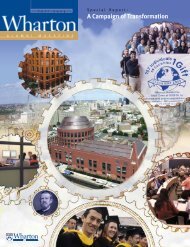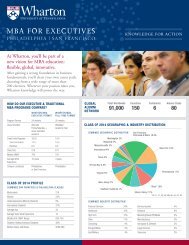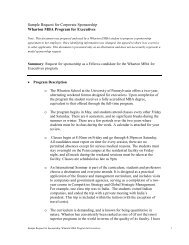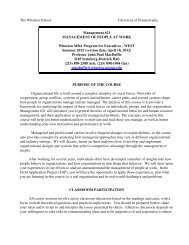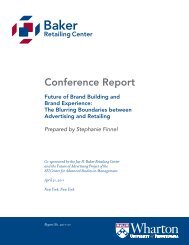Explore Options; Plan Your MBA Academic Program
Explore Options; Plan Your MBA Academic Program
Explore Options; Plan Your MBA Academic Program
You also want an ePaper? Increase the reach of your titles
YUMPU automatically turns print PDFs into web optimized ePapers that Google loves.
REAL 899 Seevak Student Research Seminar<br />
ARCH 762* Design and Development<br />
* This last course is offered as a supplementary course for real estate students<br />
by the University’s Department of Architecture. It counts towards the<br />
nineteen (19) credit units needed to graduate, as well as the five creditunits<br />
needed for the real estate major.<br />
<strong>MBA</strong> Advisor: Todd Sinai (telephone: 215.898.5390; email:<br />
sinai@wharton.upenn.edu)<br />
COURSE DESCRIPTIONS<br />
REAL / FNCE 721<br />
Real Estate Investment: Analysis and Financing<br />
Description: This course provides an introduction to real estate<br />
with a focus on investment and financing issues. Project evaluation,<br />
financing strategies, investment decision making and<br />
real estate capital markets are covered. No prior knowledge of<br />
the industry is required, but students are expected to rapidly<br />
acquire a working knowledge of real estate markets. Classes<br />
are conducted in a standard lecture format with discussion<br />
required. The course contains cases that help students evaluate<br />
the impact of more complex financing and capital markets tools<br />
used in real estate. There are case studies and two mid-terms,<br />
(depending on instructor).<br />
Format: Lecture with discussion required.<br />
Prerequisites: FNCE 611/612/613.<br />
REAL 722<br />
Housing Financing and Public Policy<br />
Description: This course examines the functions of a housing<br />
finance system, the various types of institutions that may be involved<br />
(including public as well as private), the different types of<br />
residential mortgages and mortgage-related instruments, the<br />
structure of primary and secondary markets, construction cycles,<br />
housing subsidies, and issues regarding consumer protection.<br />
Class sessions are partly lecture, partly discussion. Readings<br />
are in a bulkpack available from Wharton Reprographics and in<br />
class handouts.<br />
There will be a mid-term and final examination. Exams<br />
are open-book and emphasize problem-solving and application<br />
rather than regurgitation. They are viewed as part of the educational<br />
process for both professor and student.<br />
Prerequisites: FNCE 613.<br />
REAL 724<br />
Urban Real Estate Economics<br />
Description: Urban Real Estate Economics uses economic<br />
concepts to analyze real estate markets, values, and trends. The<br />
course focuses on market dynamics in the U.S. and internationally,<br />
with an emphasis on how urban growth and local and<br />
federal government policies impact urban development and<br />
real estate pricing. A group development project gives hands on<br />
experience, and invited guest speakers bring industry knowledge.<br />
Besides the group project and presentation, problem sets<br />
REAL ESTATE<br />
are required along with a midterm and optional second exam.<br />
Format: Lecture.<br />
Prerequisites: MGEC 611<br />
REAL 730 / BEPP 773 / FNCE 730<br />
Urban Fiscal Policy<br />
Description: The purpose of this course is to examine the<br />
financing of governments in the urban economy. Topics to<br />
be covered include the causes and consequences of the urban<br />
fiscal crisis, the design of optimal tax and spending policies<br />
for local governments, funding of public infrastructures and<br />
the workings of the municipal bond market, privatization of<br />
government services, and public financial systems for emerging<br />
economies. Applications include analyses of recent fiscal crises,<br />
local services and taxes as important determinants of real estate<br />
prices, the infrastructure crises, financing and the provision of<br />
public education, and fiscal constitutions for new democracies<br />
using South Africa as an example.<br />
Format: Lecture, discussion.<br />
Prerequisites: MGEC 611 and MGEC 612.<br />
REAL / BEPP 772<br />
Urban Public Policy and<br />
Private Economic Development<br />
Description: This course considers the pervasive interactions<br />
between real estate developers and government. Governments<br />
influence real estate development in many ways: through zoning<br />
laws, taxes, public expenditures, impact fees, infrastructure,<br />
building codes, environmental regulations, to name just a few.<br />
Much of the time in the course is spent understanding the<br />
effect on residential and commercial real estate development<br />
of these government interventions. There are lectures, student<br />
led discussions, special lectures by private developers and<br />
policy officials.<br />
Format: Lectures, student-led discussions, and special lectures<br />
by private developers and policy officials.<br />
Prerequisites: Microeconomics class with a grade of B or<br />
better.<br />
REAL / LGST 804<br />
Real Estate Law<br />
Description: This course examines the fundamentals of real<br />
estate finance and development from a legal perspective. The<br />
course serves as a foundation course for real estate majors and<br />
provides an introduction to real estate for other students. It attempts<br />
to develop skills in using legal concepts in a real estate<br />
transactional setting. The course will be of interest to students<br />
contemplating careers in accounting, real estate development,<br />
real estate finance, city planning, or banking. The main topics<br />
covered may include the following: land acquisition, finance;<br />
choice of entity; tax aspects; management (leasing, environmental);<br />
disposition of real property (sale of mortgaged property,<br />
foreclosures, wraparound mortgages, sale-leasebacks); and<br />
recent legal developments.<br />
Format: Although some of the material is presented by lecture,<br />
the instructor expects considerable class participation.<br />
71


